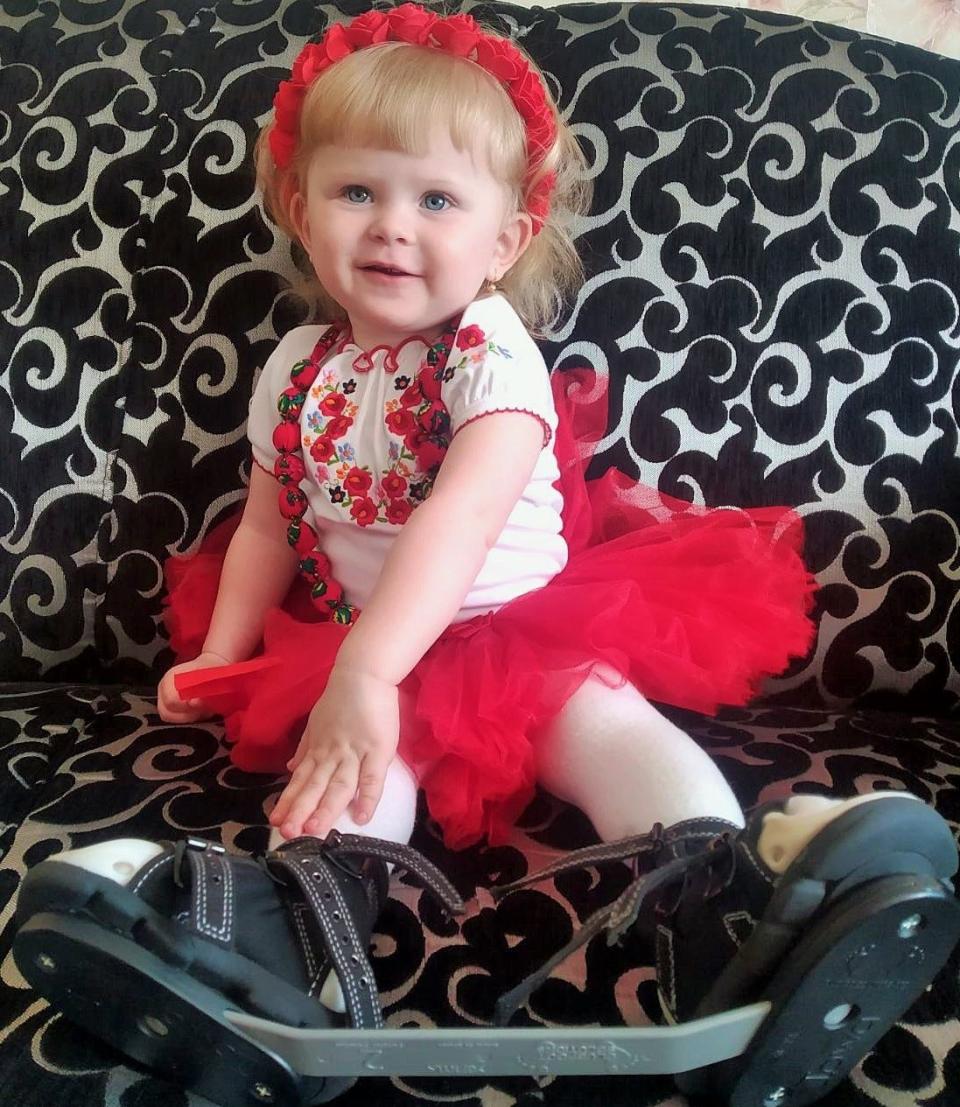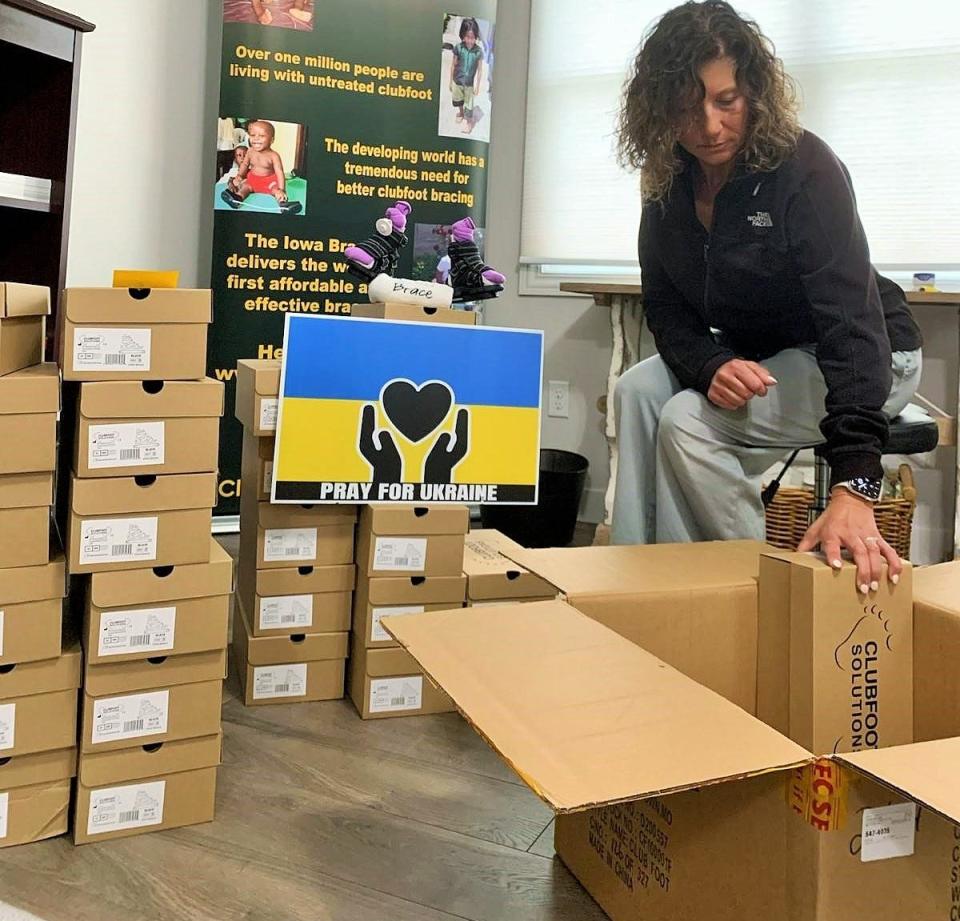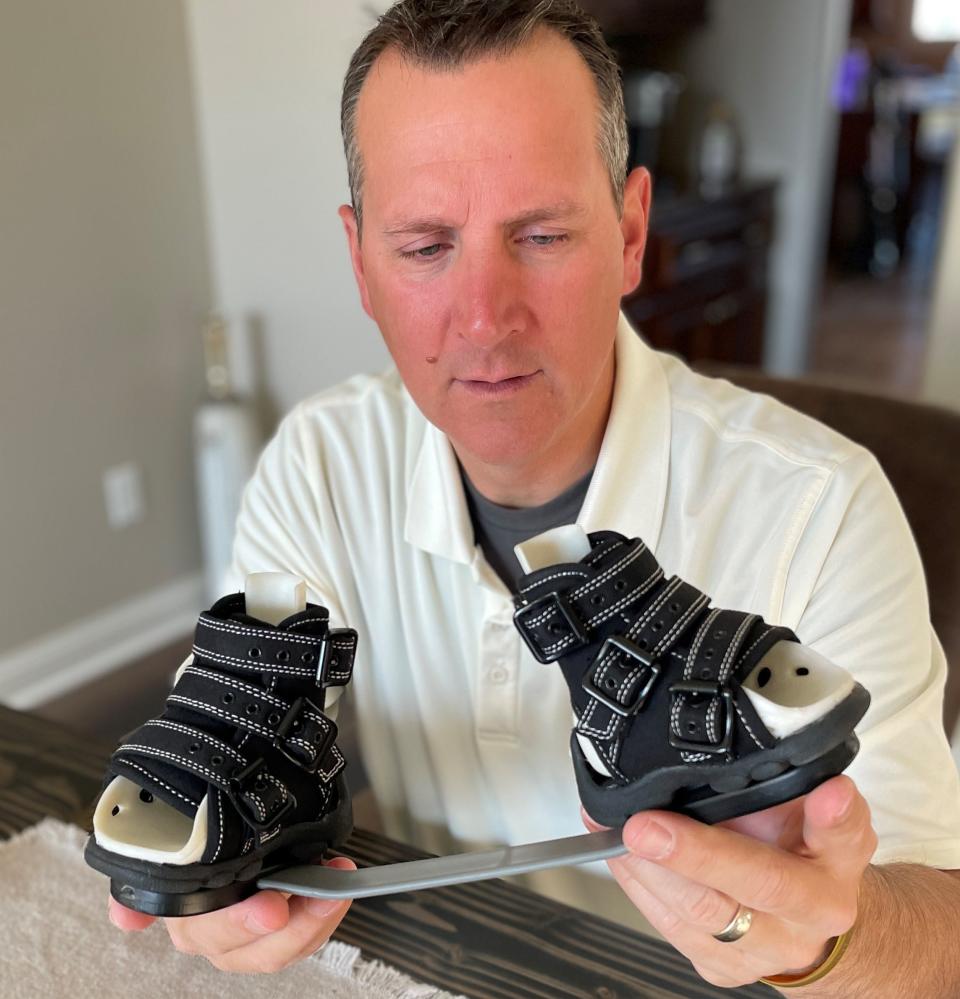'Just to help the kids': Iowa nonprofit keeps special clubfoot braces flowing to Ukraine
Among the thousands of children affected by the war in Ukraine is Yustina, a 2-year-old girl with a sweet smile who depends on her Iowa connection.
Yustina was recently treated for clubfoot through the non-surgical Ponseti Method developed decades ago at the University of Iowa, a procedure hailed worldwide. She has already had her feet gradually repositioned into proper alignment through a series of plaster casts applied by a Ukrainian doctor trained in the method.
Now that the casts are off, she must sleep every night until age 4 wearing what is called the Iowa Brace. This appliance features special shoes on either end of a sturdy nylon rod that keep her feet spread and in the corrected position. It’s a vital part of ensuring the clubfoot condition does not return and she can grow with normal mobility.
The war, of course, has complicated Yustina’s family life and her continued treatment.
When her father quit his job to join the fight against Russian invaders, Yustina and her mother fled to a small village near the unfriendly Belarus border. She wears an Iowa Brace now but will need progressively larger sizes as she grows.
Her story comes from a Ukrainian medical supply distributor named Alexander who works closely with Clubfoot Solutions, the Iowa nonprofit that provides the braces. Licensed by UI, this group designed the modern version of the brace and provides about 10,000 units each year to children in some 90 countries — more than 90% of them at affordable prices or free.
Previously: Canadian mother finds hope here for son with clubfoot

“Alexander’s medical supply business in Ukraine has been wiped out,” Todd Becker told me.
Becker is the managing director of Clubfoot Solutions, assisted by his wife, Julie. They work from their home in Bettendorf and store about 500 braces in their garage.
“Alexander is still working with us from Ukraine, just to help the kids,” Becker said. “I have told him we are going to take care of them until the country is back up and running. Sadly, Alexander is one of those guys who has been given a gun to join the fight.”
Clubfoot Solutions has shipped some 30 Iowa braces to Ukraine at no cost and plans more if they are able to safely get through to Alexander. The next shipment, Becker said, will also include small stuffed bears offered by a Canadian company to help cheer up the children. Each little bear wears a replica of an Iowa brace in the colors of the Ukrainian flag.
“Today we got a parcel from you,” Alexander wrote recently in an email to the Beckers. “We are so thankful to you for them and our Ukrainian children also! We will give priority to the citizens of the very damaged cities: Kharkiv, Mariupol, Chernihiv, and others.”
Alexander provided the Beckers with photos and short stories of several other Ukrainian children like Yustina who are undergoing clubfoot treatment and in need of braces.
“Three-year-old Bogdan’s house was damaged and his parents have had to spend all of their money to repair it,” he wrote. “Bogdan is ready for the next size Iowa Brace, but there is no money. His mother sent a video in which she tells him to not be afraid of the artillery shell explosions.”
In another report, Alexander wrote: “For five-month-old Danya, 40 to 50 bombs and rockets were falling on his city of Kharkiv every day. His parents had to evacuate to a safer city. They don’t know if their house has been destroyed.”
Becker said Clubfoot Solutions has been supplying braces to Ukraine since 2016.
“Alexander had a clubfoot child, like many of our partners in foreign countries,” Becker told me. “That’s how he got involved in it.”

Although information is sporadic, Becker said he and his wife heard from Alexander again by email this week, when he ordered 12 more pairs of Iowa Braces of various sizes. He described the situation where he is as “unstable” but added “we will never give up.”
The Beckers do not discuss his location out of concern for his safety.
“Ukrainian people are very proud and don’t want handouts,” Becker said. “Even in this last email, Alexander again said he wants to pay us back for all we are doing, but we are providing them at no cost.”
Origins: New book tells amazing story of Ponseti and his miraculous method
Clubfoot Solutions sells braces at full price to their distributors in wealthier nations, then uses those profits to fund free or drastically reduced-price braces for others in need. Becker said that a $25 donation to the nonprofit through its website at www.clubfootsolutions.org will cover the cost of getting a brace to Ukraine or another country where it is needed.
“The need is great worldwide,” he said. “We can hardly put a dent in it. About 200,000 children a year are born with clubfoot. We are working hard now on India, which has about 50,000 cases a year.”
Clubfoot Solutions was founded in Iowa City in 2012 with support from UI and has so far distributed some 85,000 braces worldwide. The brace was designed by three faculty members who continued the work of the late Dr. Ignacio Ponseti, who pioneered the non-surgical treatment here in the 1940s. The three are Nicole Grosland, Thomas Cook and Dr. Jose Morcuende.
Cook said, with the help of other UI partners and donors, the team was able to develop a simple, effective, inexpensive, high-quality brace. The shoes have a synthetic rubber liner for comfort, sturdy straps instead of Velcro to keep them in place all night and a design which makes them more socially acceptable to the parents and kids — an important concern. The bar between them can be detached to make it easier to get the shoes on and off.
Cook said, when it came time to find a manufacturer for the Iowa Brace, he pulled the name BBC International off a shoebox he saw at a local shoe store and emailed the company to explain what was needed. Its president, Don Wilborn, called back immediately. His company in Boca Raton, Florida, designs shoes and imports nearly 30 million pairs each year from China.
“He wanted to help right away, and his company took this on as a cause,” Cook said.
BBC International has a warehouse in St. Louis in which it keeps an inventory of up to 10,000 Iowa Braces on hand, plus handles direct shipments for Clubfoot Solutions as needed. Becker said DHL has discounted rates to support shipping the braces to Ukraine.
The unpopularity of the war in Ukraine has even prompted the Clubfoot Solutions partner in Russia to donate to the cause and ship braces from its own supply to Ukraine, Becker reported.
“We also have wonderful partners in Europe who are helping out,” he added.
Cook published a comprehensive biography of Ponseti three years ago. He also recently authored a soft-cover children’s book titled “Lucky’s Feet,” which is based on the real-life story of a boy with clubfoot Cook met in Nigeria.
The boy got around by crawling, until the Ponseti Method realigned his feet. By the end of the book, he is walking to school normally. Cook provides the voice for a video version of the book at www.clubfootsolutions.org.
“At one point, we shipped a 20-foot container to Nigeria which contained 3,000 braces,” he told me.
He said, before the pandemic, Morcuende averaged 10 trips abroad each year to train doctors in the Ponseti Method, plus hosted 15-20 visiting doctors annually for training at the university.
Cook shakes his head over what is happening in Ukraine and is glad the nonprofit he works with is still able to provide braces there.
“These kids didn’t choose to be born with clubfoot or in a war-torn country,” he said. “They are like kids anywhere else. What we are doing is about giving kids everywhere a shot at a normal life.”

This article originally appeared on Iowa City Press-Citizen: Iowa nonprofit sends clubfoot braces to children in war-torn Ukraine

